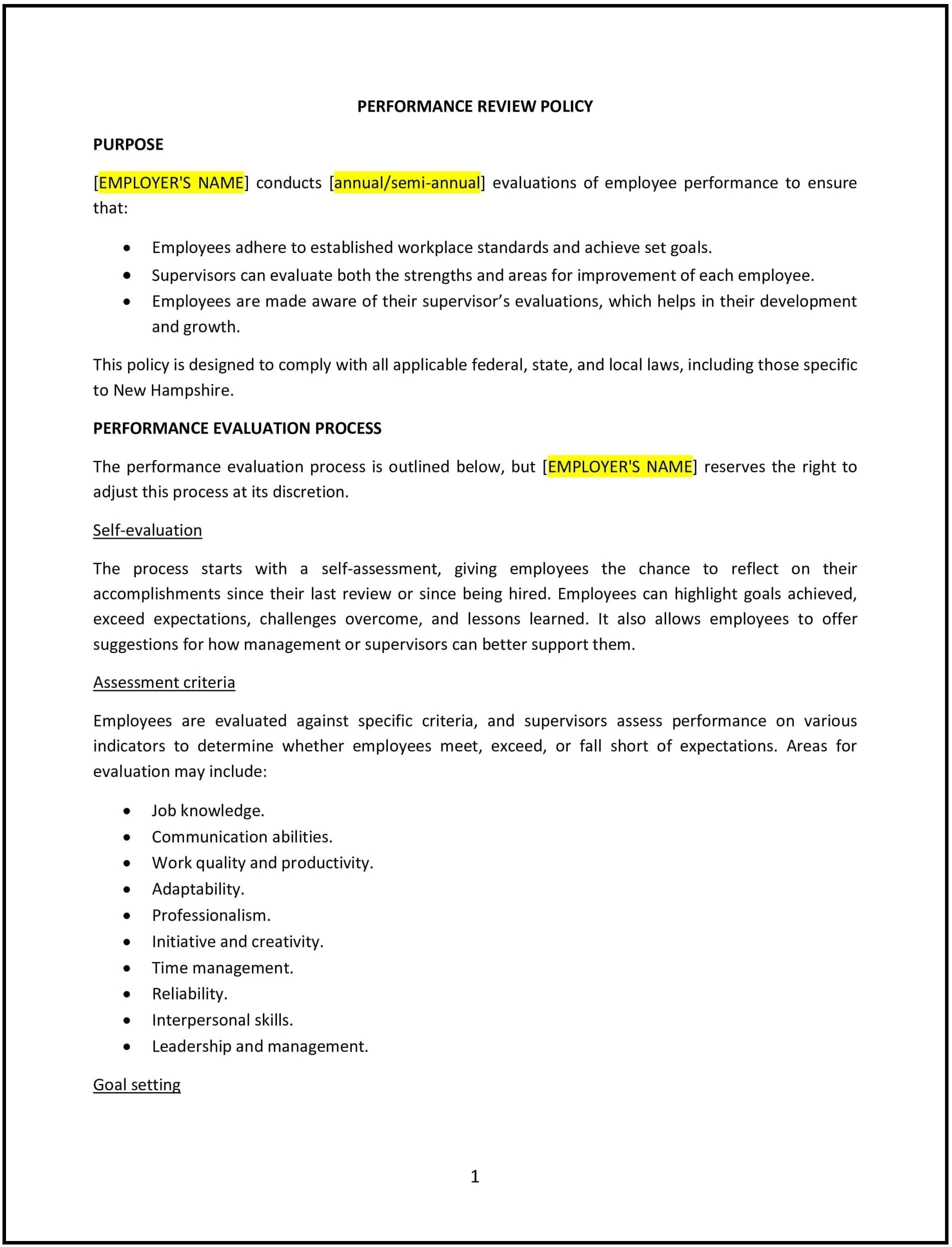Performance review policy (New Hampshire): Free template
Got contracts to review? While you're here for policies, let Cobrief make contract review effortless—start your free review now.

Customize this template for free
Performance review policy (New Hampshire)
A performance review policy helps New Hampshire businesses establish a consistent and fair approach to evaluating employee performance. This policy outlines the process for conducting regular performance reviews, setting performance expectations, and providing feedback. It aims to promote employee growth, align individual goals with company objectives, and support the professional development of employees.
By adopting this policy, businesses can create a structured process for performance evaluations, improve employee motivation, and ensure that performance-related decisions are transparent, fair, and aligned with company goals.
How to use this performance review policy (New Hampshire)
- Define the performance review process: Specify how often performance reviews will occur (e.g., annually, semi-annually, or quarterly) and outline the steps involved, including self-assessments, manager evaluations, and feedback sessions.
- Set performance criteria: Establish clear performance criteria for employees based on their job roles and responsibilities. These criteria should be measurable, objective, and aligned with the company’s goals.
- Incorporate employee feedback: Include opportunities for employees to provide feedback on their performance, challenges, and career aspirations. This promotes a two-way conversation and encourages employees to take an active role in their own development.
- Define rating system: Clarify how performance will be rated, using a consistent rating scale (e.g., exceeds expectations, meets expectations, needs improvement) to ensure fairness and consistency in evaluations.
- Set clear goals and expectations: Use performance reviews to set specific, measurable, attainable, relevant, and time-bound (SMART) goals for employees. These goals should align with company objectives and provide a roadmap for professional growth.
- Provide feedback and development plans: Ensure that managers provide constructive feedback during performance reviews, highlighting strengths and areas for improvement. If necessary, create development plans with training or support to address any gaps in performance.
- Address promotions and compensation: Include performance reviews in the process of making promotion and compensation decisions, ensuring that employees understand how their performance impacts these outcomes.
- Regularly review and update: Review and update the policy periodically to reflect any changes in business goals, performance metrics, or legal requirements.
Benefits of using this performance review policy (New Hampshire)
This policy provides several benefits for New Hampshire businesses:
- Promotes fairness: A consistent performance review process ensures that all employees are evaluated fairly based on clear, objective criteria, reducing bias and favoritism.
- Enhances employee development: Regular performance reviews provide employees with valuable feedback on their strengths and areas for improvement, promoting continuous learning and professional growth.
- Aligns individual and business goals: By setting clear goals and aligning them with company objectives, businesses can ensure that employees contribute to the overall success of the organization.
- Increases employee engagement: When employees receive regular feedback and feel supported in their development, it boosts engagement, job satisfaction, and motivation.
- Supports career progression: A well-defined performance review process allows employees to understand what is required for career advancement, helping them take the necessary steps to progress within the company.
- Strengthens communication: Performance reviews create an opportunity for open and honest communication between employees and managers, leading to improved relationships and trust.
Tips for using this performance review policy (New Hampshire)
- Communicate the policy clearly: Ensure that all employees are aware of the performance review process, the criteria by which they will be evaluated, and the expected outcomes.
- Encourage self-assessment: Ask employees to complete a self-assessment as part of the performance review process to help them reflect on their achievements and areas for improvement.
- Provide specific feedback: Ensure that feedback during performance reviews is specific, actionable, and focused on both strengths and areas for development. Avoid general comments that are not tied to measurable outcomes.
- Set clear, achievable goals: Work with employees to set realistic and attainable performance goals during their review. These goals should align with both their career development and the company’s strategic objectives.
- Be consistent: Ensure that performance reviews are conducted regularly and consistently for all employees, using the same criteria and rating system to avoid discrepancies.
- Keep documentation: Maintain detailed records of performance reviews, feedback, and development plans for future reference and for tracking progress over time.